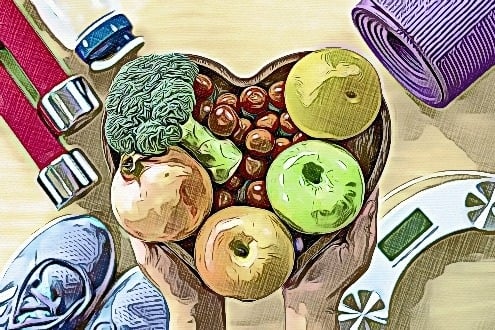6 Low Carb Foods That Clean Your Arteries
It's common to overlook things that aren't immediately visible, isn't it? However, there's crucial information you should be aware of if you've been maintaining an unhealthy diet for an extended period—your arterial health.
In this article, we will explore six of the most effective foods that can contribute to the cleansing of your arteries.
It's important to realize that just as an unhealthy diet can harm your arteries, adopting a healthy diet and lifestyle can safeguard their well-being.

Top Doctor: Do This To Relieve Tinnitus & Fight Ringing Ears


.jpg)

6 Low Carb Foods That Clean Your Arteries
What Are Your Arteries—Exactly?
Your arteries, essential blood vessels, are composed of three layers of muscular tubes. Their primary function is to transport oxygen-rich blood from your heart to the various tissues throughout your body. It is the thin inner layer of your arteries, known as the endothelium, that requires our attention.
Any dysfunction in the endothelial layer can result in inflammation, which in turn causes scarring. The scarring of arteries leads to the accumulation of cholesterol and calcium deposits known as plaques, a medical process referred to as atherosclerosis in the healthcare field.
Beware of Coronary Artery Disease (CAD)
Over time, the accumulation of plaque within the arteries causes a narrowing of these vital blood vessels, leading to reduced blood flow to the heart. This condition is known as Coronary Artery Disease (CAD).
Individuals with CAD often encounter symptoms such as intense chest pain, known as angina, as well as shortness of breath. In cases of complete blockage, a heart attack or stroke can be triggered.
Coronary Artery Calcification
If you have concerns regarding the health of your arteries, it's advisable to contemplate a Coronary Artery Calcification (CAC) test. If this test reveals indications of plaque accumulation, the following foods can be beneficial. However, why wait for unfavorable results? You can proactively focus on prevention and arterial well-being starting today.
Now, let's delve into the list and discover six low-carb foods that can assist in maintaining clean and healthy arteries.
#6 Garlic
Your heart seems to have a special fondness for garlic among all vegetables. This flavorful bulb boasts potent antioxidants that shield your cells from harm and combat infections.
Garlic stands out as an exceptional source of plant-based nutrients, including manganese, selenium, as well as vitamins B6 and C. Additionally, a single clove contains essential minerals like phosphorous, calcium, potassium, copper, and iron [1].
Numerous studies have revealed garlic's ability to lower high blood pressure and regulate cholesterol levels, offering remarkable health benefits.
However, what truly piques our interest is a 2016 study published in the Journal of Nutrition. This study investigated the effects of Aged Garlic Extract as a supplement and found that it could reverse the dangerous buildup of arterial plaque [2].
In essence, garlic and its derivatives play a pivotal role in both the prevention and treatment of coronary heart disease (CHD).
#5 Berries
Berries make a valuable addition to your diet due to their rich nutritional profile. Varieties like strawberries, blueberries, blackberries, cranberries, and more are small but mighty when it comes to promoting arterial health.
One of the key assets of berries is their abundance of plant compounds known as polyphenols, particularly flavonoids. These flavonoids exhibit antioxidant properties that can mitigate risk factors associated with atherosclerosis, such as irregular blood sugar levels, elevated LDL cholesterol, and high blood pressure.
Furthermore, the substantial nutrient content found in berries contributes to the reduction of inflammation while safeguarding your cells from damage, ultimately aiding in the prevention of arteriosclerosis [3] [4].
Research published in The American Journal of Clinical Nutrition (AJCN) uncovered that a daily consumption of blueberries for six months led to a reduction in arterial stiffness among adult volunteers who had metabolic syndrome [5].
#4 Cruciferous Veggies
Among your team of cruciferous vegetables are members like broccoli, cauliflower, cabbage, and several others. Scientists have established a strong connection between the consumption of cruciferous plant foods and enhanced artery health [6].
It's high time to give these plant foods a prominent role in your heart-healthy diet. They are packed with beneficial vitamins, essential minerals, and potent antioxidants.
These vegetables are also rich in dietary fiber, which plays a significant role in improving digestive health. Additionally, cruciferous plants contain robust sulfur-containing compounds known as glucosinolates.
The anti-inflammatory, antiviral, and antioxidant properties of glucosinolates can act as a shield against atherosclerosis. Furthermore, research indicates that glucosinolates can lower the risks of chronic diseases, including certain types of cancer [7].
Moreover, various studies have established a connection between cruciferous vegetables and the reduction of arterial calcification, subsequently lowering the risk of atherosclerosis-related diseases [8] [9].
#3 Avocados
When it comes to delectable, nutrient-rich, low-carb options, look no further than the avocado. This versatile fruit is the perfect addition to your salads, serves as a delightful sandwich filling, and is a key ingredient in creating scrumptious guacamole.
Incorporating avocado into your diet offers more than just a delightful culinary experience—it's a heart-healthy superfood with remarkable benefits for your body.
Research conducted by Penn State University indicates that consuming an avocado each day can lead to a reduction in small, dense LDL cholesterol particles. Lowering LDL cholesterol helps prevent the accumulation of plaque in your arteries. Additionally, the vitamin E present in avocados helps safeguard against cholesterol oxidation [10] [11].
Furthermore, avocados are a rich source of the essential mineral potassium, which aids in relaxing blood vessels and reducing high blood pressure.
#2 Leafy Green Veggies
Embrace the goodness of artery-nourishing leafy greens like spinach, chard, kale, and arugula—your body will genuinely appreciate it. These greens are brimming with nutrients that play a vital role in maintaining the cleanliness of your artery walls.
Leafy green vegetables provide a plethora of essential nutrients, including vitamin A, C, K, dietary fiber, and antioxidants. Additionally, they serve as excellent sources of calcium, potassium, folate, iron, and magnesium [12].
As leafy greens grow, they naturally absorb minerals known as nitrates. These dietary nitrates have the dual benefit of reducing inflammation and enhancing the functionality of your blood vessels. Furthermore, the potassium content in leafy greens helps prevent vascular calcification, a process that influences atherosclerosis [13] [14].
Numerous studies conducted over several years have extensively examined the heart-healthy advantages of incorporating leafy greens into your diet. These studies consistently demonstrate that a diet rich in these vegetables can significantly decrease your risk of heart disease [15].
#1 Extra Virgin Olive Oil
It's now confirmed: the consumption of olive oil, particularly extra virgin olive oil, significantly reduces your risk of Coronary Heart Disease (CHD) and Cardiovascular Disease (CVD), as revealed in a 24-year study first published in March 2020 [16].
So, how exactly does olive oil achieve this? What's happening inside your body?
Scientists attribute these benefits to the polyphenol compounds found in olive oil. Polyphenols are packed with potent antioxidants that promote overall heart and blood vessel health.
For maximum polyphenol intake from olive oil, opt for the extra virgin variety. It offers superior anti-inflammatory protection against atherosclerosis compared to regular oil [17].
In a 4-month study featured in the European Journal of Nutrition, researchers tracked 82 volunteers with early atherosclerosis. The results were remarkable: just 1 oz. of olive oil per day led to significant improvements in their blood vessel function and a noticeable reduction in inflammatory markers [18].
Top Doctor: Do This To Relieve Tinnitus & Fight Ringing Ears
1. https://www.bbcgoodfood.com/garlic-nutrition/
2. https://www.sciencedaily.com/aged-garlic-extract/
3. https://pubmed.ncbi.nlm.nih.gov/atherosclerosis-prevention/
4. https://www.ncbi.nlm.nih.gov/berry-consumption-on-CVD-risk/
5. https://academic.oup.com/reduce-arterial-stiffness/
6. https://www.health.harvard.edu/veggies-better-artery-health/
7. https://www.ncbi.nlm.nih.gov/pmc/glucosinolates/
8. https://www.ahajournals.org/lower-ASVD/
9. https://pubmed.ncbi.nlm.nih.gov/protect-against-vascular-calcification/
10. https://catalyst.harvard.edu/avocados-lowers-bad-LDL-cholesterol/
11. https://www.ncbi.nlm.nih.gov/prevents-cholesterol-oxidation/
12. https://www.heart.org/potassium-lowers-HBP/
13. https://www.eatright.org/leafy-greens-nutrients/
14. https://www.ncbi.nlm.nih.gov/pmc/articles/dietary-nitrates/
15. https://www.ncbi.nlm.nih.gov/pmc/dietary-potassium/
16. https://www.ncbi.nlm.nih.gov/leafy-greens-reduce-CVD/
17. https://www.ahajournals.org/lower-CHD-and-CVD-risk/
18. https://pubmed.ncbi.nlm.nih.gov/olive-oil-anti-inflammatory-effects/
19. https://link.springer.com/improved-blood-vessel-function/
Copyright 2023. All rights reserved.
This site is not a part of the Youtube website or Youtube Inc. Additionally, This site is NOT endorsed by Youtube in any way. YOUTUBE is a trademark of YOUTUBE, Inc.